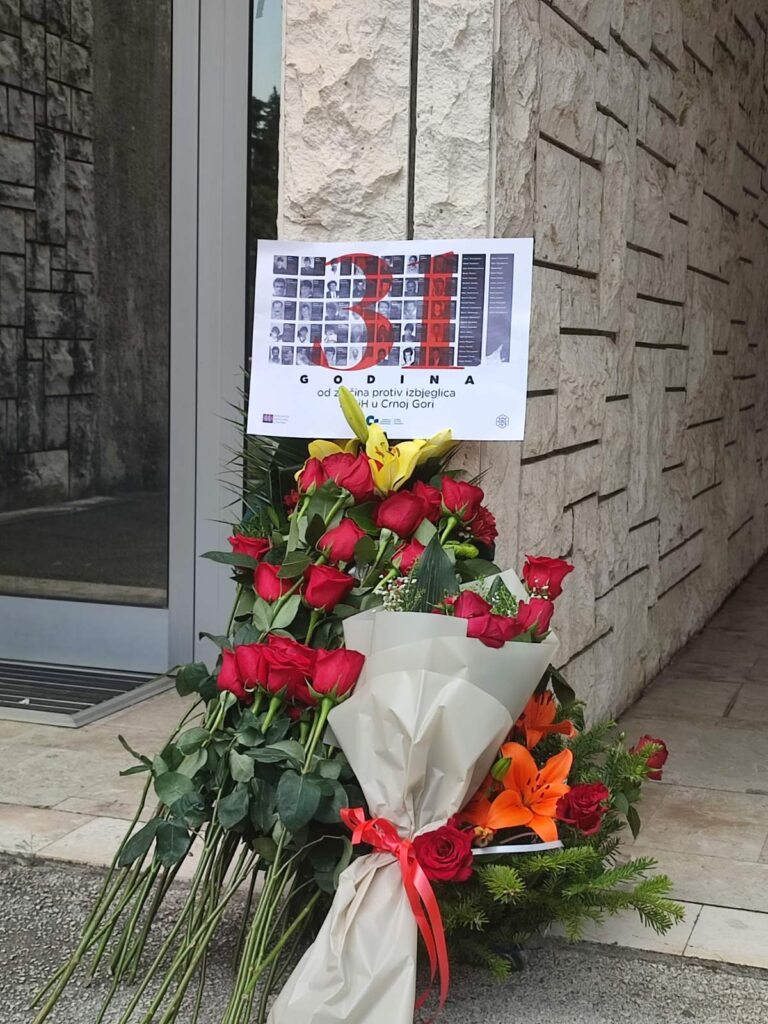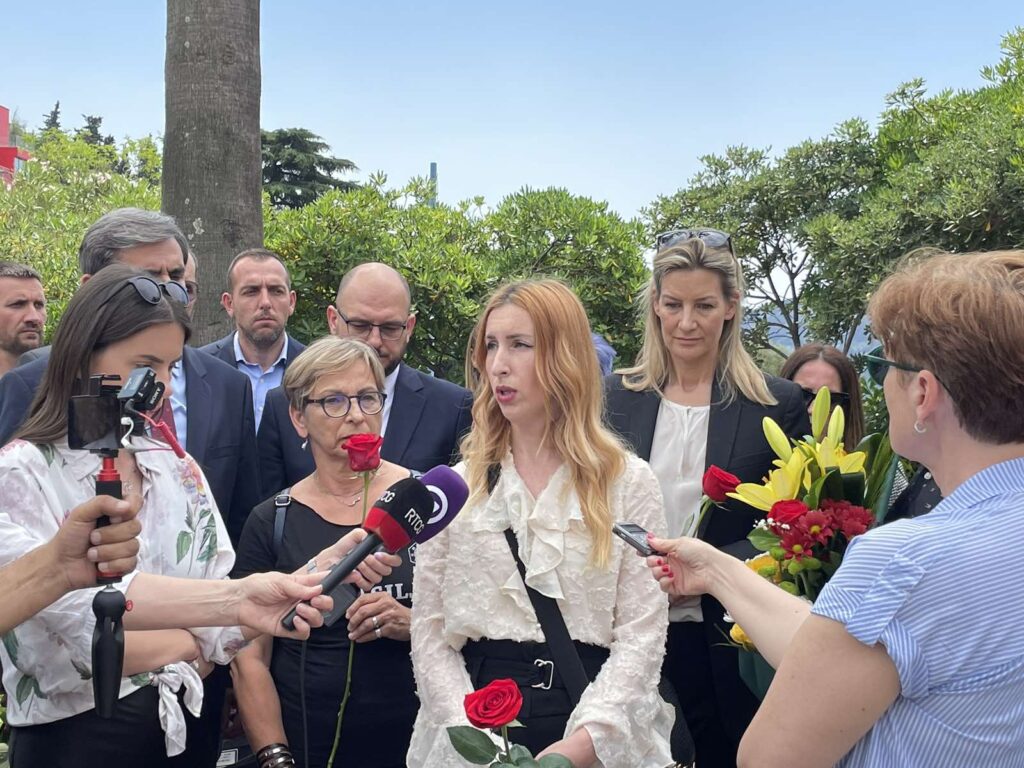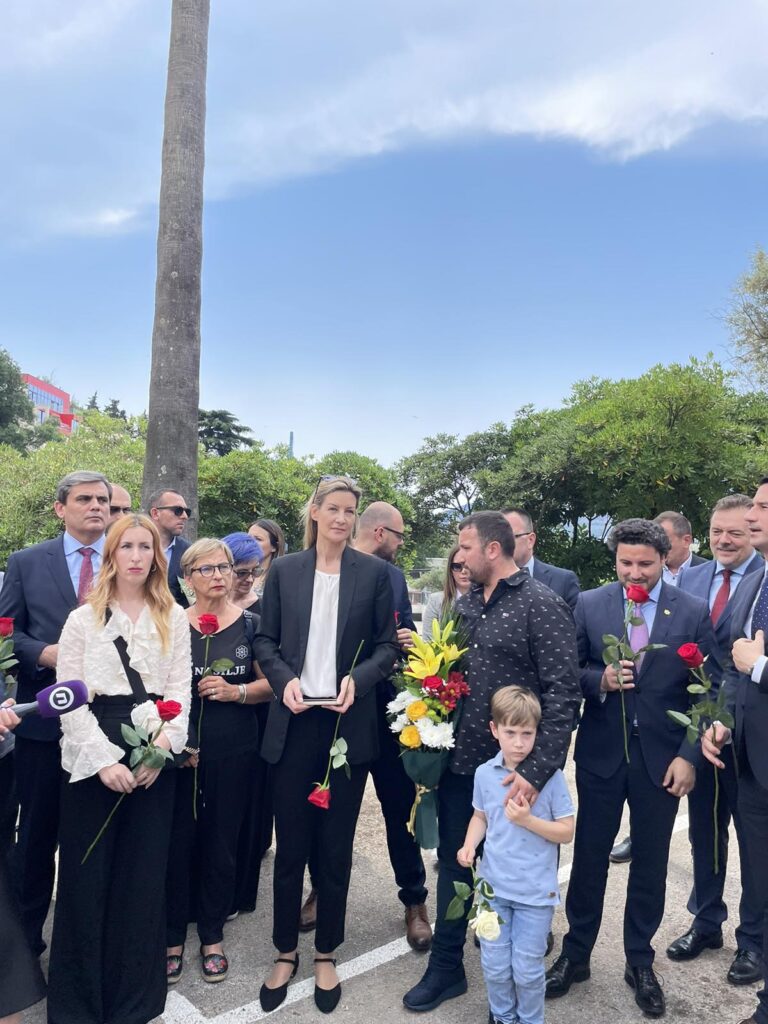A memorial gathering was held in front of the Security Centre in Herceg Novi, today at noon, to commemorate the 31st anniversary of the war crime of Deportation of Bosnian-Herzegovinian refugees. The event was organized by Human Rights Action (HRA), Centre for Civic Education (CCE), and ANIMA – Center for Peace and Women’s Education, with the attendance of the families of the victims and officials from the Government of Montenegro.
We marked this anniversary also without reopening a criminal investigation, without a monument, and without a Remembrance Day for the victims.
Among the attendees were Alen Bajrović, the son of the deceased Osman Bajrović, as well as representatives of the Government, including Prime Minister Dritan Abazović, his advisor Đorđe Radulović, Minister of Justice Marko Kovač, Minister of Labour and Social Welfare Admir Adrović, Deputy Prime Minister for Regional Development and Minister of Capital Investments Ervin Ibrahimović (President of the Bosniak Party), State Secretary in the Ministry of Interior Mersudin Gredić, acting Chief of Security Centre in Herceg Novi Slobodan Đokić, and State Secretary in the Ministry of Defense Krsto Perović.
Apart from Minister Ibrahimović, no other governmental official addressed the gathering.
Around fifty participants attended the event, including the Ambassador of Bosnia and Herzegovina to Montenegro, Branimir Jukić, representatives of the Islamic Community, the Bosniak Council, UNDP in Montenegro, political parties (URA, SDP, SD, Bosniak Party, Liberal Party), non-governmental organisations, activists, and citizens of Herceg Novi. The list of participants is available here.
“For years, we have been advocating for criminal justice, for a monument for the victims, a Remembrance Day, and an apology from the Montenegrin police. We have seen that apology last year, but nothing more. We do all this to prevent anything similar from happening again – and it won’t happen again only if the authorities decide, through their actions, to prevent it. When they go beyond words – when they create a monument, declare a Remembrance Day, and make additional efforts to punish this crime,” said Tea Gorjanc Prelević, Executive Director of HRA. The Director of HRA reminded all those present, at the end, of those who attended memorial gatherings and kept the memory of the victims of this crime, and who have since passed away – Zorica Jovetić, Blažo Krivokapić, Mirsad Kurgaš, Slobodan Pejović, Radomir Prelević and Rifat Rastoder.
“Today, I stand with a great degree of discomfort. I don’t know if the discomfort was greater when we were alone, coming here almost subversively to leave flowers, or if it is now when I stand in front of these people from the Montenegrin government and speak, and most of them could have done much more than they did specifically for this crime and all other crimes. All those who stand behind us, and they are not the first one who just come for a photo, must do something. At least for this crime that happened here there should be a memorial, there should be criminal prosecution, the organisers and instigators should be identified, and the victims should be respected in a way that everything is made public. In the educational system, there should be a lesson about the war crimes that occurred in Montenegro, so that future generations know and at least three sentences are dedicated to what Deportation means,” said Ljupka Kovačević, coordinator of ANIMA.
“We in civil society are very disappointed with the position of the institutions towards this war crime. We have seen that nothing has been done even in the eight years since the Strategy for Investigating War Crimes was adopted, through which the Special State Prosecutor’s Office (SSP) committed to re-examining all cases of war crimes prosecuted before Montenegrin judicial authorities. Unfortunately, despite changes in the SSP, we do not have the impression that there is a different approach to these cases,” said Tamara Milaš, coordinator in the CCE.
“I am Alen Bajrović, son of Osman Bajrović, whom the Montenegrin police, specifically the Security Centre in Herceg Novi, in front of which we are now standing, captured in our family home in Bijela and violently tore him away from our embrace, mine and my sister’s, and brought him to this killing ground, to the ‘camp’ that lies before us. After that, we haven’t heard anything about him. I believe this is the camp where my father was, and most likely ended up. I pose a question to the institutions of Montenegro – what have they done to my father, where was he killed, and how was he killed?! I demand that the competent institutions conduct a proper and fair investigation and bring the orchestrators, perpetrators, and all those involved in this war crime that occurred on the territory of Montenegro to justice.
I must express my outrage towards the institutions that have not exerted even a fraction of the energy required to shed light on this crime. I have still not found the remains of my father, so this year, just like the previous one, we will lay a wreath at the building of the Security Centre, because I believe it is the only tombstone for my father.” – Alen Bajrović, son of the deceased Osman Bajrović.
“I call on everyone to give the maximum effort to create this memorial that is necessary for all of us – to serve as a warning, to ensure that we do not forget, that it does not happen again, and to make us all aware of how dangerous dark times and dark politics can be and how they bring no good to anyone. Therefore, as the Deputy Prime Minister and President of the Bosniak Party, I declare that I will not allow this crime to be forgotten and that I will fight with all means to finally satisfy the families in one way or another, but also to bring all the conspirators of this terrible crime, both indirect and direct to justice and ensure that justice prevails in Montenegro. Finally, achieving justice is healing for our entire society because otherwise, we send a terrible message that crimes in Montenegro are profitable.” – Ervin Ibrahimović, Deputy Prime Minister and President of the Bosniak Party.
“Today, we send another appeal for a monument to be erected at this location, one that will remind us of those shameful days. This time, I want to emphasize that it is necessary to uncover the perpetrators and masterminds behind these acts and bring them to justice so that the souls of the deceased can rest in peace. Once again, I appeal to the local authorities to finally assume their responsibilities and install a memorial at this site that will commemorate that infamous day. Days and years pass, but the pain does not cease, it only grows stronger. Every cry of the bereaved is a slap to Montenegro, and every tear is a stain on Montenegro’s past. The image of the Montenegrin people has been tarnished – people who defended and built their glory, pride, and dignity throughout the ages, paying for it with the lives of their finest sons. And a group of individuals, small-minded people in high state positions, have shaken all of that and cast a shadow upon it.” – Vido Drašković, representatives of the Liberal Party of Montenegro.
Unofficial, civic Montenegro has been paying tribute to the victims of this war crime for 19 years now, with an annual memorial gathering in front of the police station in Herceg Novi, from where the largest number of unlawfully arrested civilians from Bosnia and Herzegovina were handed over to the Army of Republika Srpska. This year, once again, we do not allow the victims of this war crime to be forgotten. We demand the establishment of criminal responsibility and a dignified memorial for the victims.
We remind that in May 1992, the Montenegrin police unlawfully arrested at least 66 civilians aged between 18 and 66, who had fled to Montenegro from the ongoing war in Bosnia and Herzegovina. They were handed over as hostages to the Bosnian Serb Army under the leadership of Radovan Karadžić and Ratko Mladić, to be used for the exchange of prisoners of war. Written documents and a final judgment by a criminal court testify to this fact. All those extradited from Herceg Novi on 27 May 1992, were immediately killed, while the second group, sent to the concentration camp in Foča (KPD) on 25 May 1992, only had a few survivors. The bodies of all the victims deported from Herceg Novi on 27 May 1992, have still not been found, and the exact location of their deaths remains unknown. At least 33 Serbian civilians were also arrested and deported for forced mobilization into the army of the then Serbian Republic. We have no information that any of them were killed.
The victims of this crime are indisputable, and after a four-year trial, Montenegro compensated their families for the unlawful actions of the Montenegrin police that resulted in fatalities and severe torture of survivors, based on a settlement. The fact that they were unlawfully arrested and extradited as hostages have been established by a final criminal verdict in Montenegro, as well as by the verdict of the International Criminal Tribunal for the former Yugoslavia in the case against Milorad Krnojelac, the warden of the camp in Foča. However, the Montenegrin court did not punish this crime. This year, the European Court of Human Rights has issued a disappointing decision on dismissing a complaint of nine women, mothers, wives, sisters, and daughters of the six deceased refugees, almost then years after they filed a complaint against Montenegro for the violation of their right to life. The Court concluded that the families of the victims had lost their status as victims under the Convention because the state had compensated them for damages and had conducted a criminal proceeding, regardless of the incorrect application of international humanitarian law, which influenced the acquittal of all the accused, and although the investigation and indictment did not encompass the state leadership.
Ten years ago (in 2011), HRA, CCE, ANIMA, and former member of the Council for Civilian Control of Police Work, Aleksandar Saša Zeković, submitted three initiatives to the authorities that time, only one of these initiatives has been accepted by this day, which is the public apology by the Montenegrin police for the unlawful arrest and extradition of refugees to the enemy forces of the Serbian Republic of Bosnia and Herzegovina.
The following initiatives submitted have still not been accepted:
- To the former President of the Montenegrin Parliament, Ranko Krivokapić, and all the heads of parliamentary clubs, to declare a Remembrance Day for the victims of the deportation crime in 1992.
- To the former Prime Minister of Montenegro, Igor Lukšić, the Minister of Internal Affairs, Ivan Brajović, the Minister of Culture, Branislav Mićunović, and the former President of the Municipal Assembly of Herceg Novi, Dejan Mandić, to erect a memorial monument to the victims of the deportation of refugees in 1992 in front of the Police Administration Station in Herceg Novi, thus supporting the wishes of the families of the deceased victims.
We also submitted an initiative to the former President of the Montenegrin Parliament, Aleksa Bečić, on 19 May 2021, to declare a Remembrance Day. He responded that it would require a change in the law but did not initiate the change.
After the formation of the local government in Herceg Novi, we submitted an initiative to the councilors of the Municipal Assembly of Herceg Novi, as well as to the President of the Municipal Assembly, Ivan Otović, to erect a memorial monument for the victims of the deportation of refugees, but there was no response. We also informed the Mayor of Herceg Novi, Stevan Katić, about the initiative, but he also did not respond. Otović and Katić are still at the same functions.
Human Rights Action (HRA)
Centre for Civic Education (CCE)
ANIMA – Center for Peace and Women’s Education



